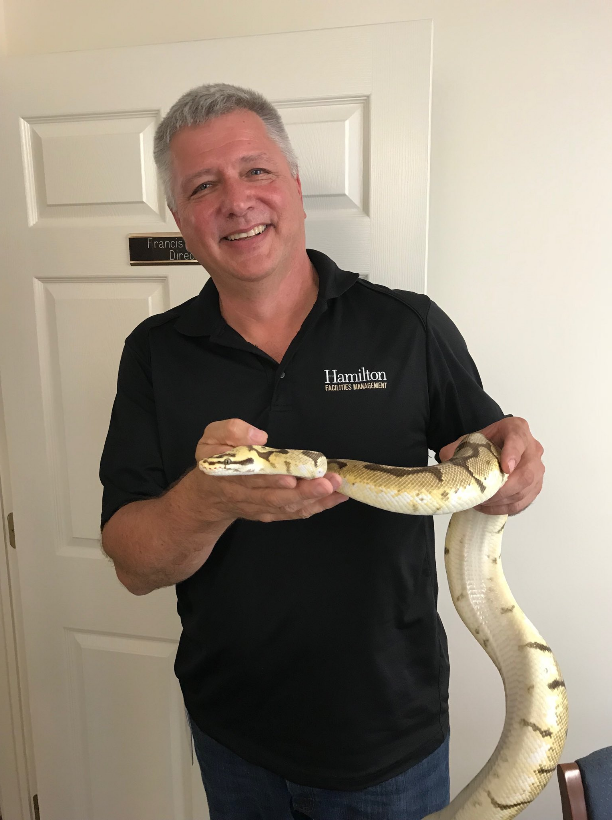
Last Tuesday, Aug. 28, a ball python snake measuring between four and five feet was found in a room in the Bundy East residence hall by a student resident. The student, who wishes to remain anonymous, became aware of the reptile at approximately 9 AM that morning. Initially, she says she could not make out what it was, saying that she thought the animal to be fake and left in jest by friends. She says she was not alarmed.
At approximately 11 AM, however, when she poked the creature with a coat hanger and it proceeded to move, she contacted Campus Safety and Facilities. Upon realizing the situation at hand, Ground Manager Donald Croft took charge of the extraction, working with his team to secure the animal in a bag so that it could be transported from the residence hall. The team then contacted the Utica Zoo, who referred college personnel to the Woodhaven Wildlife Center, a wildlife rehabilitation center located in Chadwicks, NY. According to Director of Campus Safety Francis Coots, the snake is no longer on campus, although its new location is unknown.
The reptile in question was not from the wild but was instead the domestic companion of a male Hamilton student, who also wishes to remain anonymous. He did not register the animal with the College and was housing it in secrecy. At this point, it is unclear how long he had been in possession of the snake while in residence at the College, as well as his motivations for keeping the animal.
Coots described the response of students within Bundy East to the reptile as “mixed.” He recalls that some students were “rightfully” alarmed but that many also proved quite helpful, offering Campus Safety and Facilities useful information in their extraction efforts.
Resident Advisor for Bundy East Zhaosen Guo ’21 declined to comment, citing privacy and neutrality concerns. “Given the fact that this case is a policy violation, I believe it would be in my advisees’ best interest to keep what I know private,” she said. “Furthermore, as a RA of Bundy East, providing my perspective on this matter would be inappropriate: my goal is to make sure everyone involved in this case is feeling safe and supported in our community, and by giving my opinion, I would lose my neutrality and professionalism as a RA.” Guo added that his objective was not to “discourage coverage on important campus issues.”
With regards to potential disciplinary action, Associate Vice President for Student Affairs Jeffrey Landry declined to speak on this particular incident. Instead, he cited the section entitled “Pets” from the College’s Student Handbook, which reads: “Cats, dogs, birds or other animals are not allowed in the residence halls without prior authorization. Fish tanks up to 15 gallons are the only exception to this policy. If this policy is violated, disciplinary action may be taken, and the animal will be removed from the residence hall.” Landry did say that in past years, “students have been held accountable for unauthorized pets.”
Speaking generally on the situation, Coots suggested that there are several lessons to be learned. “We have a responsibility to our neighbors,” he said, urging all students to contact the office of Allen Harrison, Associate Dean of Students for Multicultural Affairs and Accessibility Services, if they wish to keep pets on campus. He explained that the only animals that may be brought to or kept on Hamilton’s campus are those housed in academic buildings, and those registered as service or support animals. Finally, he urged all students to contact Campus Safety to report anything they may perceive to be unusual or suspicious, saying, “We want every student to feel comfortable — that’s our goal. And, even if we are unsure about a specific policy, we can assist students to find where that policy is located.”

















